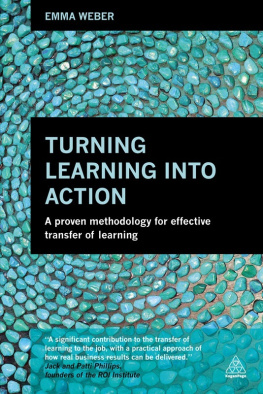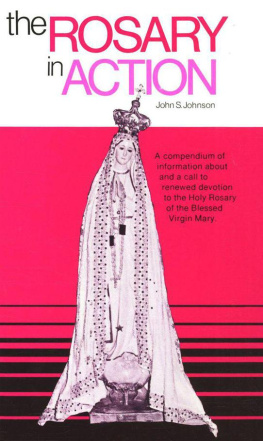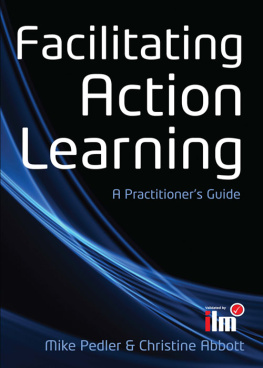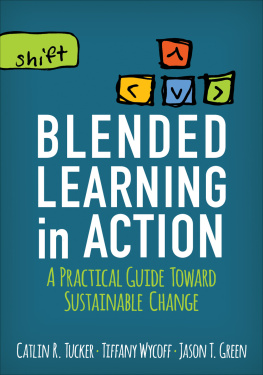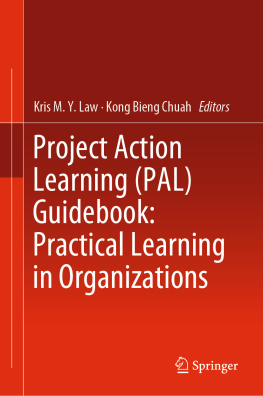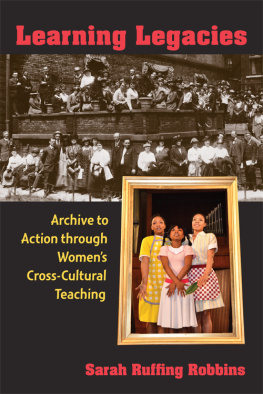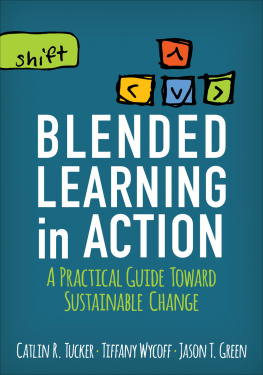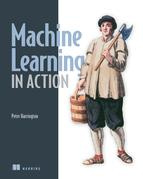Yury Boshyk - Action Learning: History and Evolution
Here you can read online Yury Boshyk - Action Learning: History and Evolution full text of the book (entire story) in english for free. Download pdf and epub, get meaning, cover and reviews about this ebook. year: 2010, publisher: Palgrave Macmillan, genre: History. Description of the work, (preface) as well as reviews are available. Best literature library LitArk.com created for fans of good reading and offers a wide selection of genres:
Romance novel
Science fiction
Adventure
Detective
Science
History
Home and family
Prose
Art
Politics
Computer
Non-fiction
Religion
Business
Children
Humor
Choose a favorite category and find really read worthwhile books. Enjoy immersion in the world of imagination, feel the emotions of the characters or learn something new for yourself, make an fascinating discovery.

- Book:Action Learning: History and Evolution
- Author:
- Publisher:Palgrave Macmillan
- Genre:
- Year:2010
- Rating:4 / 5
- Favourites:Add to favourites
- Your mark:
- 80
- 1
- 2
- 3
- 4
- 5
Action Learning: History and Evolution: summary, description and annotation
We offer to read an annotation, description, summary or preface (depends on what the author of the book "Action Learning: History and Evolution" wrote himself). If you haven't found the necessary information about the book — write in the comments, we will try to find it.
Action Learning: History and Evolution — read online for free the complete book (whole text) full work
Below is the text of the book, divided by pages. System saving the place of the last page read, allows you to conveniently read the book "Action Learning: History and Evolution" online for free, without having to search again every time where you left off. Put a bookmark, and you can go to the page where you finished reading at any time.
Font size:
Interval:
Bookmark:
Many contributed to the development of this book, but no one more importantly than Reg Revans himself. His voice is evident throughout, and much of it is not based on third party recall. What is stated frequently comes from personal conversations and correspondence with Revans. A number of the authors knew him and spent considerable time with him. Dilworth met him in 1991, was captivated by his concepts and deep insights, and went on to become a colleague and friend. Yury Boshyk never met Reg but, after the intensity of research on this book, feels that he knows Revans first hand.
Other important contributors included David Botham, Albert Barker, Alan Mumford, Verna Willis, Mike Pedler, and Donna Vick, all of whom personally knew Revans and provided important perspectives. Albert Barker and David Botham each spent a great deal of time with Revans. Barker was especially close to Revans in seeing to his needs, particularly after his wife Norah died.
David Botham was Revans choice to become the Director of the Revans Centre when it was dedicated in 1995. Donna Vick was the first Revans Scholar, receiving a full scholarship to pursue her doctorate at the Revans Centre for Action Learning and Research at the University of Salford, and Revans became her mentor. She then joined the faculty.
Others who supported the development of action learning in critical ways and are no longer with us also are reflected in this book, including Lord Butterfield of Stechford, Professor John Morris, Nelson Coghill, and Janet Craig Revans close collaborator, friend and personal archivist for many years, and others.
For assisance in the research, as well as some of the people already mentioned, we and David Bellon would like to thank Roger Talpaert, Dirk Deschoolmeester, Daniel Deveusser, Leopold Vansina, Dirk Symoens, Luc Drieghe, Roland Van Dierdonck, Kenneth Bertrams and Liliana Petrella. From the U.K., we would like to thank Albert Barker, David Botham, Catherine Guelbert, Jean Lawrence, Alan Mumford, Pat Wright, Ian Hall, Jan Hall, Chavi Chi-yun Chen, Pavlo Smoliy, David Pearce; in France, Claire Meneveau, Chantal Fleuret and Leonie Chouard; in Germany, Otmar Donnenberg, Wolfgang Braun, Klaus Bodel and Karl-Georg Degenhardt; in Sweden, ke Reinholdsson, Pia Anderberg, and Lennart Rohlin; in the U.S., Verna Willis, Donna Vick, Lucinda Gibson-Myers, Lars Cederholm, Isabel Rimanoczy, Noel Tichy, John Johns, and Donald Sadoway. Thanks also to our publisher Stephen Rutt and Paul Milner for their understanding. To Nadia and Doris for their insight and support.
Revans influenced many people in his lifetime, and had over six hundred active correspondents around the world. He generously contributed of his time, rarely receiving any kind of stipend. To him, the development of action learning was a calling, no less compelling than that of a theologian. He saw action learning as more than an approach or technique. To him, it was a vehicle that could help provide a healthy balance in society, create more positive relationships and a deeper sense of fulfillment between employers and employees, and help understanding and peace among and between nations. These views undoubtedly came from his strong Quaker roots.
In sum, there are many people who have contributed to this book and to the development of action learning, but the major acknowledgement goes to Reg and his lifetime of service to action learning and humanitarian endeavors. He stands as our guiding light. Thanks also to our publisher Stephen Rutt and Paul Miner for their understanding and to the team at Newgen for their excellent editorial and typesetting services.
Explaining Traditional Action
Learning: Concepts and Beliefs
Robert L. Dilworth
This chapter is designed to provide a thorough examination of traditional action learning, and the concepts and beliefs of its principal pioneer and founder, Reg Revans. As such, it is pure Revans what he really believed and practiced. The chapter also shows how these roots of action learning have been adulterated, diluted and contradicted by later interpretations of how action learning should be practiced. Some profess alignment with what Revans believed, and then do something else that can be quite different.
Revans never intended for all applications of action learning to be carbon copies of his beliefs. That was not his intent, but he did hope that certain basic ingredients would be present, without regard to the design used. They include true empowerment of learners; minimum interference in the process by external expert facilitators; use of real problems that are of genuine difficulty and urgency; getting people out of their comfort zones by having them operate in unfamiliar settings and deal with unfamiliar problems; and reflecting throughout on these experiences and the assumptions behind their actions, including their implementation of solutions to the real problem addressed. Few of these precepts seem to carry much weight today in the way action learning is practiced. In some cases, the learning coach has been made the center of what happens. Revans believed, as most adult educators believe, that the learner is the center of the process. To him, action learning is democracy at work, letting the action learners largely self-govern what strategies and approaches they will use to diagnose what is happening and achieve a clear view of the problem.
The father of action learning, Reg Revans, began as a physicist, before making his mark as an economist and educator. He was a revolutionary thinker, a person who could be abrasive and was, by nature, a maverick. He encountered much resistance along the way from those who were ensconced in traditional ways of viewing things and could see him as a threat. Revans would often say, Unless your ideas are ridiculed by experts, they are worth nothing.
Revans never lacked the willingness to stand up for his beliefs, even if it could work against his professional success. Having been appointed as a Professor of Industrial Administration at what is now the University of Manchester in England, he ended up walking away. It seems to have been a mutual agreement. He did not want to stay and they did not encourage him to remain on the faculty. His ideas had clashed sharply with the ideas of more traditional academics. He was never driven by a desire for personal wealth. He lived an extremely Spartan existence, eating sparingly and spending little on himself, aside from book purchases. His eating habits could be a concern for family and friends. What he valued were ideas and making a difference. Action learning became his passion, and he viewed it as a promising avenue for opening up meaningful dialogue and promoting world peace. He was a Quaker, had a pacifist point of view, and abhorred world conflict and weapons of mass destruction. While he realized that he had special intellectual gifts, he was also a man of genuine humility, who believed in serving others rather than self. However, that does not mean he was short on ego. He had a healthy regard for his accomplishments and liked to have them recognized.
Revans lived to see his ideas widely adopted, but not without some continuing resistance. Certain of his precepts, especially those related to experiential learning, can receive particularly strong resistance because they seem so counter-intuitive (e.g., having learners tackle problem areas that they know little or nothing about, with the expectation that they will diagnose the problem, arrive at a solution, and have an uncommon learning experience in the process). As stated elsewhere in this book, the growth of action learning did not bring a great deal of acclaim to Revans, and some of his most basic and important precepts fell from view. One finds people citing him and his work, perceiving it as something significant, but without really having a clear idea of how he fits into the scheme of things. This book sets out to counter this shortfall and place Revans beliefs in full view.
Font size:
Interval:
Bookmark:
Similar books «Action Learning: History and Evolution»
Look at similar books to Action Learning: History and Evolution. We have selected literature similar in name and meaning in the hope of providing readers with more options to find new, interesting, not yet read works.
Discussion, reviews of the book Action Learning: History and Evolution and just readers' own opinions. Leave your comments, write what you think about the work, its meaning or the main characters. Specify what exactly you liked and what you didn't like, and why you think so.

